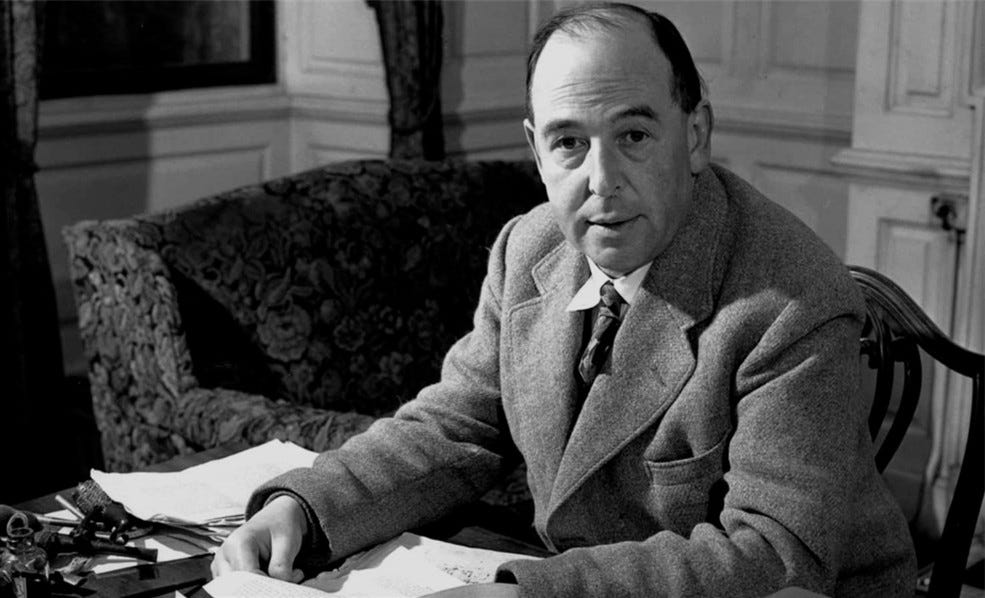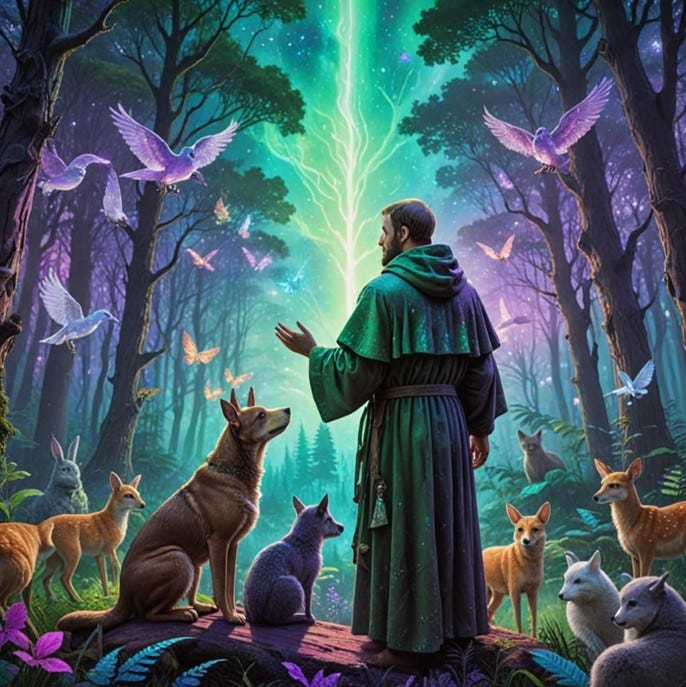In July of 2020, when we were well into Covid, night after night, I watched Jupiter and Saturn perform their slow, luminous waltz across the sky—a majestic dance that quietly defied the chaos of the pandemic below. By year’s end, those two largest planets had drawn so close together that one would swear they were swaying to a rhythm only they could hear.
In late spring Mars began rising in time to share the dance floor, although it kept its distance! I enjoyed awaiting the appearance of Jupiter as the sky gradually darkened. It became visible well before any stars. They became my cosmic friends!
Seeing those planets was (and is) a gift. (After all, they do appear on a regular basis.) I have been reminded that, in the grand scheme of things, our problems—as genuinely serious as they are—still are part of a vast intergalactic tapestry. Contemplating such matters has become almost a spiritual discipline. It has been therapeutic.
“The heavens are telling the glory of God; and the firmament proclaims his handiwork.” So says the beginning of Psalm 19.
[Clive Staples Lewis, 1898-1963]
This psalm is one of my absolute favorites. It would seem I’m not alone in that. It has been admired through the ages for its poetic beauty. A prominent writer in the 20th century also had great esteem for it. That would be C. S. Lewis, professor at Oxford and author of numerous books, including The Chronicles of Narnia and Mere Christianity. A professed atheist, he came to Christ, partly due to his conversations with his friend J. R. R. Tolkien.
Lewis’ praise for the psalm has been widely quoted. “I take this to be the greatest poem in the Psalter,” he wrote, “and one of the greatest lyrics in the world.”
I wish he had said how he really felt!
He spoke of how the psalmist describes “the sun, the bridal joyousness of its rising, the unimaginable speed of its daily voyage from east to west… The key phrase on which the whole poem depends is ‘there is nothing hid from the heat thereof.’ It pierces everywhere with its strong, clean ardor.”
(I need to acknowledge the reflections penned by our dearly departed Old Testament professor, Dr. Tom McDaniel, in his article, “A Psalm by a Blind Poet”!)
What is it about this psalm that stirs such wonder, even in the hearts of intellectual giants like Lewis? Let’s take a look at how it unfolds.
Psalm 19, which celebrates the word of God, is laid out in three sections. The first part, verses 1 to 6, is an exaltation of the majesty of creation. Verses 7 to 11 glorify the written word, with the benefits thereof: it is perfect, sure, right, clear, pure, true, and righteous.
It revives the soul. It makes wise the simple. It rejoices the heart. It enlightens the eyes. Its beauty puts gold to shame. And how does it taste? Sweeter than honey, child! Psalm 119 agrees. “How sweet are your words to my taste, sweeter than honey to my mouth!” (v. 103).
We end with verses 12 to 14 with a prayer of repentance and protection—and that includes protection from oneself. You did know we can be our own worst enemy? The psalm ends with words that might be familiar. “Let the words of my mouth and the meditation of my heart be acceptable to you, O Lord, my rock and my redeemer.” (More about that one later.)
So there is much in this psalm, but I want to focus on something I know I need help with—silence.
I started with speaking about admiring my friends, those radiant beauties in the night sky. I thought of how long it took their light to reach me. (Minutes? Over an hour?) I can’t hear them, but they proclaim the work and word of God.
[Galaxy AM 0644-741 is a ring galaxy 300 million light years away]
Verse 3 speaks, “There is no speech, nor are there words; their voice is not heard.” Their voice is not heard, and yet, “their voice goes out through all the earth, and their words to the end of the world” (v. 4).
Maybe if I simply just shut up, I could hear their silent statements, their wordless words. Maybe if I weren’t so busy thinking about what I could say about them, I could listen, and my soul would be enriched. I could pass that blessing along to others. But no, I have to focus all my attention on myself.
Sometimes my dog joins me on these nocturnal sojourns. After a little play time, he will lie down and occupy himself with chewing on a stick, or he’ll walk around, sniffing stuff. He doesn’t say much. I could take a lesson from him.
I want to revisit that final verse: “Let the words of my mouth and the meditation of my heart, etc.” The word translated as “meditation” is an interesting one (הׅגָּיוׄן, higgayon). It carries the meaning of a “murmuring sound.” It’s compared to the sound of a harp when struck. There’s that lingering tone, fading to silence. It’s not like a drum, something percussive, something rat-a-tat. It’s smooth.
Another translation speaks of “the whispering of my heart” (New Jerusalem Bible). It is as loud as a whisper, as strident as a sigh.
One is reminded of the prophet Elijah as he flees the wrath of Jezebel, wife of King Ahab. Elijah has presided over the killing of the prophets of Baal. Jezebel is not happy, and she gives orders to her hitmen. That’s when Elijah hits the road.
In the desert, the word of the Lord comes to him. It isn’t in the wind or the earthquake or the fire. It isn’t in any of the sound and fury. It is in sheer silence, a small still voice. It is “a light murmuring sound” (1 Kg 19:12, NJB).
We tend to be quite uncomfortable with silence. We can notice that in worship. Such moments can seem to go on and on.
There’s another thing I want to mention in this psalm. Verse 13 says, “Keep back your servant also from the insolent; do not let them have dominion over me. Then I shall be blameless, and innocent of great transgression.” The poet wants protection from the insolent, the arrogant ones. The plea is to be shielded from the harm they would do. However, the Hebrew word (זֵד, zēḏ) can have another nuance. It also refers to “proud thoughts.” Inner insolence is also in view.
So often, it’s not others’ arrogance that ensnares us, but our own. Those internal whispers of pride, the certainty of our opinions, the need to be heard—they can blind us to the divine murmurings all around.
You know, I have my opinions. But at the end of the day, they pale in comparison with Jupiter and Saturn and Mars, who keep doing their thing. The noise we humans make doesn’t affect them at all. And my opinions pale in colossal fashion in comparison with the one who says in Isaiah, “as the heavens are higher than the earth, so are my ways higher than your ways and my thoughts than your thoughts” (55:9). Period.
Our proud thoughts affect the way we treat others. They shape how we treat both our neighbors and the Earth itself. St. Francis of Assisi, the patron saint of ecology, reminds us that creation is not merely scenery—it is sacred speech. Our carelessness deafens us to the voice of the earth. Our reverence permits us to celebrate its song.
[Francis and his audience]
I have considered something with which St. Francis would be an excellent guide. We have the honor of treading lightly on the earth. Indeed, walking on God’s good creation can be an act of prayer in itself. Think of it. We easily disregard that. We pave over everything. Our bombs and weapons of war kill more than just humans. Lord only knows how many plants and animals we kill. We dump poison and plastic on land and in the sea. We foul the atmosphere.
We destroy ourselves, and in doing so, we defile the presence of God within us. We grieve the Holy Spirit.
So tonight, or some night soon, I invite you—with hopes of blessing—to go outside. Leave your phone behind. Let the noise fall away. Gaze upward. Let the silence settle in and listen. Not with your ears, but with your soul.
You might just hear the voice that has no words. You might just feel the embrace of that “strong, clean ardor” that C.S. Lewis described.
And perhaps, in that holy hush, your heart will begin to murmur too—not with judgment or fear, but with awe… and gratitude… and love.
+++++++
“Can you bind the chains of the Pleiades or loose the cords of Orion? / Can you lead forth the Mazzaroth in their season, / or can you guide the Bear with its children? / Do you know the ordinances of the heavens? / Can you establish their rule on the earth?”
(Job 38:31-33)






